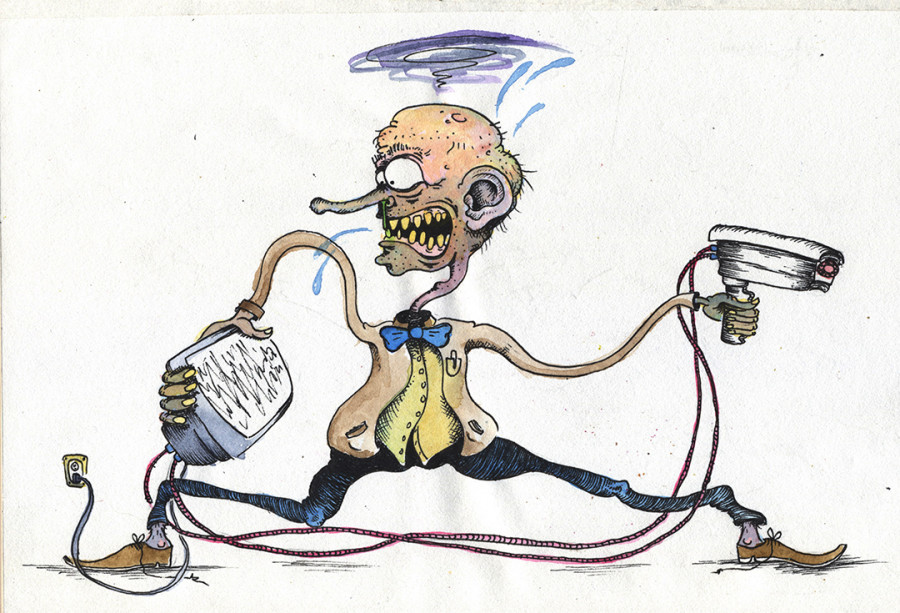Editorial
The Surveillance State of Canada Needs to End
In the past two weeks, we in Quebec got to turn the tables and take a look inside the tactics of police surveillance.
Over the period of a few days, it was revealed that the Service de police de la Ville de Montréal spied on journalists Patrick Lagacé and Vincent Larouche, and that the Sûreté du Quebec had also spied on a handful of other journalists.
What’s more, the management of the Montreal police signed off on the creation of a unit whose explicit purpose was to track and disrupt “marginal movements and anarchists.”
In the cases of police spying on the press, wiretapping warrants were obtained through judges. The police’s justification for spying was to find which officers were leaking information to journalists. Whistleblowing is vital to keeping the police accountable and the public informed, and, by working against it, law enforcement worked against the interests of the population.
With regards to police spying on activists, these revelations proved something long suspected by social organizers: that the police profile based on political beliefs.
State repression of social movements is clear when riot police brutalize protesters, but such violence is just the most visible result of a police culture designed to maintain established power. Remember, this was an official police unit tasked with surveying activists, and these were wiretaps approved by judges.
Nowhere in the surveillance of journalists and activists is the pretense of protecting the public from crime. That isn’t to say that mass surveillance is ever a good thing, or that it’s even helpful for preventing criminal activity, because it isn’t. Yet these are not isolated incidents.
The public needs to know that Canada is a surveillance state. Last week it was revealed that the Canadian Security Intelligence Service illegally retains metadata of Canadian citizens.
Metadata is the information that accompanies electronic communication but not the information inside the communication itself. Your phone number or email address, the time and place of your call or email or text, or the length of your FaceTime calls are all examples of metadata.
That CSIS kept this information and tried to hide its activities shows that they, just like the SPVM, knew their behaviour was wrong and that the public would be incensed if these actions came to light.
Bill C-51, which is still in force, also serves as a reminder that governments in Canada will push the limits of legal and constitutional surveillance if given the chance.
A legacy of the Harper era, Bill C-51 gives law enforcement wide-reaching powers of preemptive arrest, surveillance, travel restriction, and speech limitation.
Passed in the aftermath of the Parliament shooting, the bill was a major issue in the 2015 federal elections. Justin Trudeau said during his campaign that his government would make the law more moderate. Over a year later, it’s unchanged.
Federally and municipally, these repressive practices won’t go away without sustained public pressure. The Government of Quebec announced the creation of a public inquiry into freedom of the press and police surveillance of journalists, according to a Canadian Press article from Nov. 3. That’s nowhere near enough.
As members of the press, as activists, as humans living under the panopticon of inhumane state surveillance, we demand that the provincial government expand the mandate of its public inquiry to include all police surveillance as a first step towards the broader dismantling of mass surveillance in Canada.
Any inquiry must take into account the disproportionate surveillance faced by groups perceived as threatening the status quo, such as leftist social movements and Indigenous land defenders.
We must understand state repression and surveillance not as excesses by rogue police forces, but as part of a historic and overarching strategy to preserve the status quo and maintain state power. It’s not like this hasn’t happened before.
In 1977, the McDonald Royal Commission discovered a series of illegal acts committed by the RCMP. These included stealing the membership list of the Parti Quebecois and burning down a rumoured Front de Liberation du Quebec and Black Panther Party meeting spot.
The RCMP was also found to have spied on election candidates, and conducted hundreds of illegal break-ins.
As a result, the RCMP had its national security powers removed, which led to the creation of CSIS in 1984, which was then staffed by many of the former RCMP officers who had broken the law. Now it’s CSIS who has broken the law, and the cycle begins anew.
We need to resist the encroachment of the surveillance state into our lives. We need to organize against growing police powers. We need to work towards the abolition of mass surveillance through inquiries and political action. And we need to make it last.




